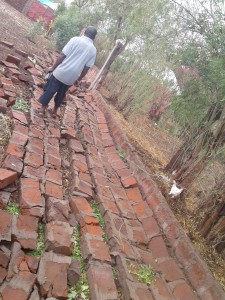Many of you will be familiar with a ‘Snow Day’. Here we have mud days. It is raining every night and the soil is such that it is very sticky and slippery. The ruts in the road become overpowering and take your car on it’s own course, but you have to keep going or you will be literally ‘sunk’. Deo is a great driver and can get us out of our road, however you have to hold onto your seat because it’s quite a rough ride. I think he would make a good winter driver although he may end you up on the wrong side of the road as people here often drive on whichever side has the best conditions.
Walking is also treacherous and your shoes hold the muck like nothing I’ve seen. Anna went to school yesterday with plastic bags over her shoes. She says the mud won’t stick to the plastic.
Because of the weather, we had a disappointing turnout at the workshop. Only 4 teacher attended however the 4 were keen to learn and they had a good session.

 Chemistry teachers were conducting an experiment to determine the energy contained in kerosene fuel. They massed the fuel before and after heating a beaker of water. They determined the heat used to heat by measuring the temperature change and related it back to the mass difference.
Chemistry teachers were conducting an experiment to determine the energy contained in kerosene fuel. They massed the fuel before and after heating a beaker of water. They determined the heat used to heat by measuring the temperature change and related it back to the mass difference.
 Biology teachers were testing exhaled breath vs. air in the room for CO2. The apparatus was constructed from straws. It delivers exhaled breath into the lime-water of one flask and above the lime-water in the other flask. The lime-water is an indicator for CO2. As the concentration of CO2 increases the lime-water becomes more opaque and milky. It shows that the body converts oxygen in the air to CO2.
Biology teachers were testing exhaled breath vs. air in the room for CO2. The apparatus was constructed from straws. It delivers exhaled breath into the lime-water of one flask and above the lime-water in the other flask. The lime-water is an indicator for CO2. As the concentration of CO2 increases the lime-water becomes more opaque and milky. It shows that the body converts oxygen in the air to CO2.


Physics teachers were using the meter bridge  to determine the resistance of a wire. I learned something new. I learned that a bent wire has more resistance than a straight wire. As shown in the photo, the bottom wire has a resistance around 1 ohm more than the straight wire. We tested it with an ohmmeter.
to determine the resistance of a wire. I learned something new. I learned that a bent wire has more resistance than a straight wire. As shown in the photo, the bottom wire has a resistance around 1 ohm more than the straight wire. We tested it with an ohmmeter.
 This experiment is rather sensitive and requires consistency and thought. It also requires a fair amount of analysis.
This experiment is rather sensitive and requires consistency and thought. It also requires a fair amount of analysis.
Good workshop….bad turnout. What can you do?



![IMG_2138[1]](https://dosciencetanzania.files.wordpress.com/2017/07/img_21381.jpg?w=510)
![IMG_2134[1] IMG_2134[1]](https://dosciencetanzania.files.wordpress.com/2017/07/img_21341.jpg?w=181&resize=181%2C241&h=241#038;h=241)
![IMG_2166[1] IMG_2166[1]](https://dosciencetanzania.files.wordpress.com/2017/07/img_21661.jpg?w=321&resize=321%2C241&h=241#038;h=241)
![IMG_2136[1]](https://dosciencetanzania.files.wordpress.com/2017/07/img_21361.jpg?w=510)
![IMG_2177[1]](https://dosciencetanzania.files.wordpress.com/2017/07/img_21771.jpg?w=364&h=273)
![IMG_2145[1]](https://dosciencetanzania.files.wordpress.com/2017/07/img_21451.jpg?w=510)
![IMG_2158[1]](https://dosciencetanzania.files.wordpress.com/2017/07/img_21581.jpg?w=380&h=286)






 to determine the resistance of a wire. I learned something new. I learned that a bent wire has more resistance than a straight wire. As shown in the photo, the bottom wire has a resistance around 1 ohm more than the straight wire. We tested it with an ohmmeter.
to determine the resistance of a wire. I learned something new. I learned that a bent wire has more resistance than a straight wire. As shown in the photo, the bottom wire has a resistance around 1 ohm more than the straight wire. We tested it with an ohmmeter. This experiment is rather sensitive and requires consistency and thought. It also requires a fair amount of analysis.
This experiment is rather sensitive and requires consistency and thought. It also requires a fair amount of analysis.


